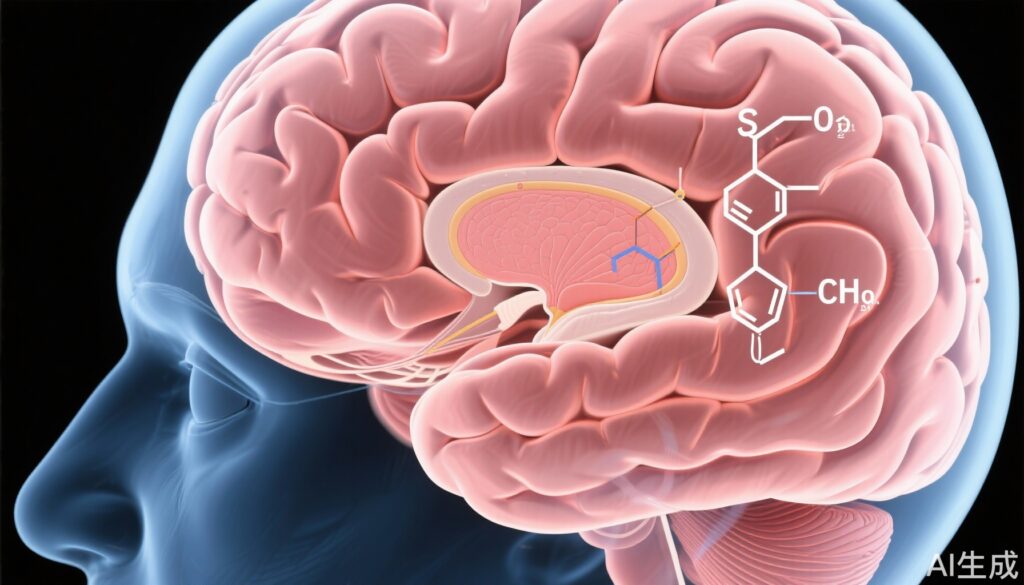Highlight
– Sodium benzoate, a D-amino acid oxidase (DAO) inhibitor, significantly improved short-term memory in patients with amnestic mild cognitive impairment (aMCI).
– The study was a randomized, double-blind, placebo-controlled trial over 24 weeks involving 82 aMCI patients.
– Overall cognitive improvement showed a positive trend but did not reach statistical significance.
– Sodium benzoate was well tolerated without additional adverse effects compared to placebo.
– The ‘recall of test instructions’ item of ADAS-cog may be a sensitive measure for memory improvements in aMCI.
Study Background and Disease Burden
Mild cognitive impairment (MCI), particularly amnestic MCI (aMCI), represents a transitional stage between normal cognitive aging and early Alzheimer’s disease (AD), characterized predominantly by deficits in memory, especially short-term memory. As the world’s aging population grows, the burden of MCI is increasing, with a significant risk of progression to dementia. Currently, there are no approved pharmacotherapies specifically indicated for aMCI, creating an unmet medical need for interventions that can preserve cognitive function and delay progression.
Previous studies have suggested that sodium benzoate, an inhibitor of D-amino acid oxidase (DAO), may enhance cognitive function in mild AD by modulating glutamatergic neurotransmission through N-methyl-D-aspartate receptor (NMDAR) pathways. However, the efficacy of sodium benzoate in MCI and its impact on core cognitive domains, such as short-term memory, remain to be clarified. This study evaluates the therapeutic potential and safety profile of sodium benzoate in patients with aMCI.
Study Design
This investigation was a 24-week randomized, double-blind, placebo-controlled clinical trial conducted at a major medical center in Taiwan. A total of 82 patients diagnosed with amnestic mild cognitive impairment were enrolled. Participants were randomly assigned to receive sodium benzoate or placebo in doses ranging from 250 mg to 1500 mg daily. The titration schedule allowed flexible dosing to optimize therapeutic exposure.
The primary outcome measure was overall cognitive performance assessed by the Alzheimer’s Disease Assessment Scale-Cognitive Subscale (ADAS-cog). Given prior reports of ADAS-cog’s limited sensitivity in detecting subtle cognitive changes in aMCI, the trial also focused on the ‘recall of test instructions’ item within the ADAS-cog, a specific measure of short-term memory function. Efficacy comparisons between groups were conducted using generalized estimating equations accounting for repeated measures over time.
Key Findings
Over the 24-week treatment period, sodium benzoate demonstrated a notable and statistically significant improvement in short-term memory, as reflected by the ‘recall of test instructions’ item in ADAS-cog (P = 0.044) compared to placebo. This signifies that sodium benzoate positively affects the core memory impairment seen in aMCI.
Although the overall ADAS-cog total score improvement with sodium benzoate indicated a favorable trend, it did not reach conventional statistical significance (P = 0.082). This suggests while global cognitive benefits are promising, larger samples or longer treatment durations may be required to detect definitive effects.
Importantly, both sodium benzoate and placebo groups demonstrated good tolerability. The incidence of adverse events was comparable with no additional side effects attributable to sodium benzoate, underscoring its favorable safety profile in this population.
Expert Commentary
The observed improvement in short-term memory aligns with sodium benzoate’s proposed mechanism of modulating NMDAR function via DAO inhibition. By reducing D-serine degradation, sodium benzoate may enhance synaptic plasticity and glutamatergic neurotransmission critical for memory encoding and retention. This mechanistic insight supports the biological plausibility of the clinical findings.
However, the limitations of the study include a moderate sample size and relatively short follow-up period, which may restrict the generalizability and the detection of broader cognitive benefits. Notably, the ADAS-cog’s total score has been critiqued for insensitivity in early-stage cognitive impairment, and focusing on its memory-specific components may offer improved clinical relevance.
Future multi-center trials with larger cohorts and potentially combined biomarker assessments could validate the therapeutic efficacy and define optimal dosing regimens. Additionally, examining long-term effects on progression to Alzheimer’s dementia would be valuable.
Conclusion
This randomized controlled trial suggests that sodium benzoate, as a DAO inhibitor, holds promise for improving short-term memory in patients with amnestic mild cognitive impairment. The favorable safety profile and targeted cognitive benefits position sodium benzoate as a potential therapeutic candidate addressing an unmet clinical need in early cognitive decline. The sensitivity of the ‘recall of test instructions’ subscore of ADAS-cog may provide clinicians a practical tool to monitor treatment response in MCI. Larger, rigorously designed studies are warranted to confirm and extend these preliminary findings, potentially altering the therapeutic landscape for MCI.
References
- Lin CH, Wang SH, Lane HY. Sodium benzoate, a D-amino acid oxidase inhibitor, improved short-term memory in patients with mild cognitive impairment in a randomized, double-blind, placebo-controlled clinical trial. Psychiatry Clin Neurosci. 2025 Aug;79(8):466-472. doi: 10.1111/pcn.13841IF: 6.2 Q1 . Epub 2025 May 23. PMID: 40405827IF: 6.2 Q1 .
- Lin C-H, Lane H-Y. Sodium benzoate as a potential treatment for cognitive impairment: insights from clinical trials. Expert Rev Clin Pharmacol. 2021;14(7):807-814.
- Schobel SA, et al. Early detection and treatment of mild cognitive impairment and Alzheimer’s disease: challenges and opportunities. Am J Psychiatry. 2020;177(9):739-748.
- Brouillette J, et al. N-methyl-D-aspartate receptor modulation in Alzheimer’s disease: from pathophysiology to therapy. Transl Neurodegener. 2012;1(1):4.
- ClinicalTrials.gov Identifier: NCT04736355. Evaluation of Sodium Benzoate in Amnestic Mild Cognitive Impairment.



